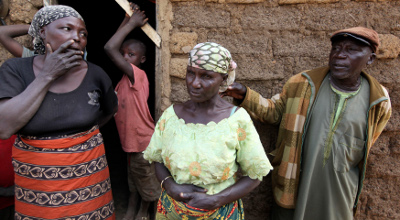Church of Christ in Nigeria Reeling From Massacre
In the Plateau state of central Nigeria, tensions had run high all week between ethnic Fulani, who are mainly Muslim, and ethnic Birom, mainly Christian. It was only the latest outbreak of anger in a decade-long cycle of aggression and reprisals.
But this time, anxiety ran high enough that, by Sat., July 7, about 50 members of the Church of Christ in Nigeria around the village of Maseh had fled their homes, taking refuge in the home their pastor.
The gunmen came Saturday, entering the home and opening fire. Then they burned the house.
“Fifty of our church members were killed in the church building where they had fled to take refuge. They were killed alongside the wife of the pastor and children,” said Dachollom Datiri, vice president of the Church of Christ in Nigeria, in a July 11 interview with Open Doors News at the church’s headquarters in Jos.
Church officials said that in all, about 100 Church of Christ members were killed in the weekend attacks in 12 villages: Maseh, Ninchah, Kakkuruk, Kuzen, Negon, Pwabiduk, Kai, Ngyo, Kura Falls, Dogo, Kufang, and Ruk.
“In these 12 villages, all the church buildings of our church were burnt by the Muslim attackers,” Datiri said.
Fulani spokesmen denied involvement. On Tuesday, the radical Islamic group Boko Haram said it was responsible for the attacks, and insisted all Christians abandon Christ and accept Islam or they “would never know peace again.”
The Church of Christ in Nigeria, more than a century old and claiming 3.5 million members in Nigeria and beyond, has suffered before. Some 40 church pastors have been killed in the past 10 years, Datiri said.
Even against such a violent backdrop, the killings on July 7 and 8 were especially traumatizing. The Nigerian government imposed a dusk-to-dawn curfew on the region. Still, survivors of the violence are fleeing their villages in search of safe places to stay, said the Obed Dashan, general secretary of the Church of Christ in Nigeria.
“They are psychologically traumatized, and their productive economic activities are impeded,” Dashan told Open Doors News. “Most of them are peasant farmers and the attacks have not allowed them to go to their farms. Even those that have planted crops have had their crops destroyed by the Muslim attackers.”
The displaced farmers, Dashan said, “cannot go to their farms because they have to flee in order to save their lives. So, it is a war to starve Christians, and this is impacting on the church negatively as we have to feed or cater for our church members who are now displaced.”
As families have fled, they have taken their children with them. “Children cannot go to school as they have to flee, thereby creating a generation of illiterates,” Dashan said.
The history of conflict between Nigerian Christians and Muslims has roots in land disputes, political opportunism, quarrels over national power sharing, and other causes, but the Church of Christ leaders said the current situation is evidence of an institutionalized persecution of Christians.
“We’ve heard that the (Nigerian military) is here to provide protection to the weaker side in the conflict between Christians and Muslims,” Dashan said. “They have openly said they are here to protect Muslims. However, it is this same Muslims who are being protected that are attacking Christians and destroying our villages and church buildings. There is no single mosque that has been destroyed by Christians and we have never been on the offensive; so, why (are they) aiding Muslims to attack us?”
“It is outrageous,” Datiri said, “for the military to abandon peasant Christians who have no weapons to defend themselves and then claim that Muslims, who are the aggressors, are the weaker party and need to be protected.”
At the same time, Faluni representatives have told news agencies that Christians have attacked Muslim communities. Christian church leaders across Nigeria have urged believers to refrain from retaliation, though not all have paid heed.
“The whole thing is coming to a head,” Datiri said. “It’s been a long-term thing planned by the Boko Haram. This is a jihadist movement with the agenda to Islamize the country. It is a jihad, a religious war against Christians for refusing to embrace Islam. So, they are using terrorism as a weapon. That is the reason you see that the target of their attacks are Christians and our churches.”














































